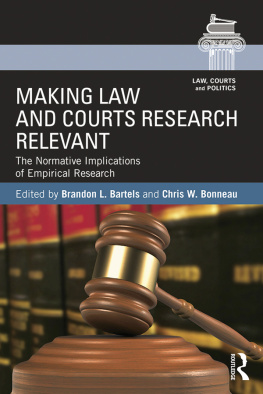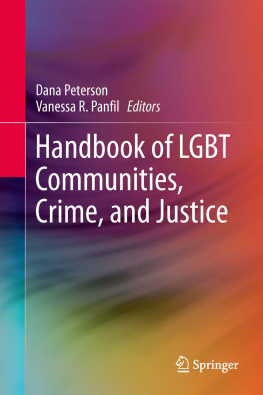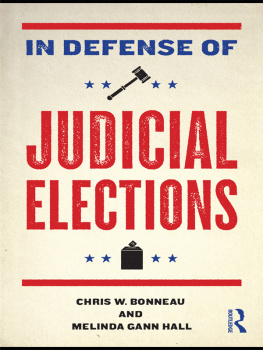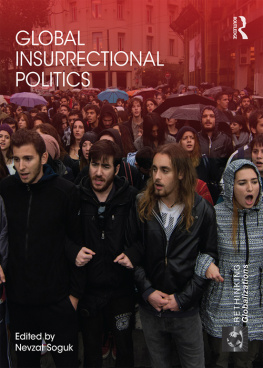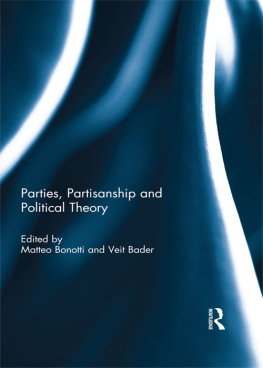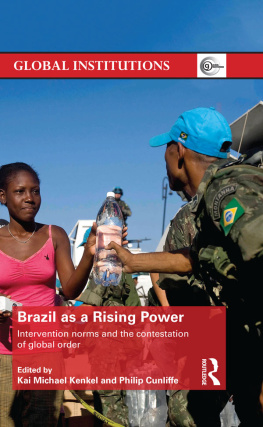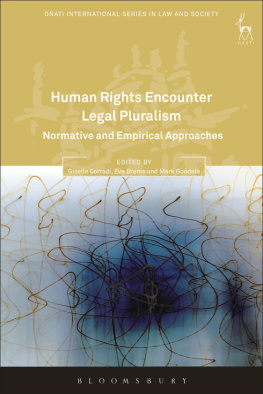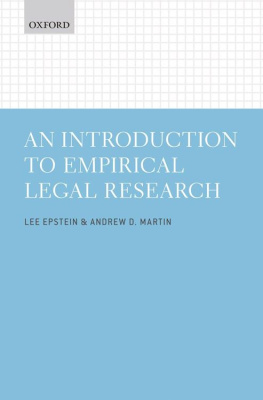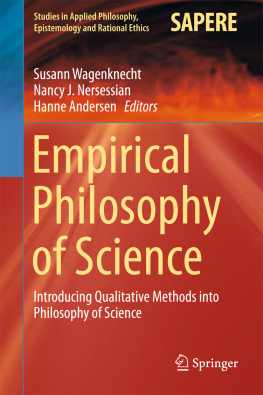Making Law and Courts Research Relevant
One of the more enduring topics of concern for empirically oriented scholars of law and courtsand political scientists more generallyis how research can be more directly relevant to broader audiences outside of academia. This concern stems from the seeming disconnect between empirical and normative scholars of law and courts that has increased in recent years.
Brandon Bartels and Chris Bonneau argue that being attuned to the normative implications of ones work not only enhances the quality of empirical work, but also makes it substantially more interesting to both academics and non academic practitioners. Their books mission is to examine how the normative implications of empirical work in law and courts can be more visible and relevant to audiences beyond academia. Written by scholars of political science, law, and sociology, the chapters in the volume offer ideas on a methodology for communicating normative implications in a balanced, nuanced, and modest manner. The contributors argue that, if empirical work is strongly suggestive of certain policy or institutional changes, scholars should make those implications known so that information can be diffused. The volume consists of four sections that respectively address the general enterprise of developing normative implications of empirical research, law and decision making, judicial selection, and courts in the broader political and societal context.
This volume represents the start of a conversation on the topic of how the normative implications of empirical research in law and courts can be made more visible. This book will primarily interest scholars of law and courts, as well as students of judicial politics. Those in other subfields of political science who are engaging in empirical research will also find the suggestions made in the book relevant.
Brandon L. Bartels is Associate Professor of Political Science at George Washington University. His research focuses on judicial decision making, the U.S. Supreme Court, and public perceptions of law, courts, and institutional legitimacy. His work has been published in the American Political Science Review, American Journal of Political Science, Journal of Politics, Public Opinion Quarterly, and other outlets.
Chris W. Bonneau is Associate Professor of Political Science at the University of Pittsburgh. His research focuses on judicial selection and has been published in journals such as the American Journal of Political Science, Journal of Politics, and others. He is co-author of In Defense of Judicial Elections and Strategic Behavior and Policy Choice on the U.S. Supreme Court.
Law, Courts and Politics
Edited by Robert M. Howard, Georgia State University
In Democracy in America, Alexis de Tocqueville famously noted that scarcely any political question arises in the United States that is not resolved, sooner or later, into a judicial question. The importance of courts in settling political questions in areas ranging from health care to immigration shows the continuing astuteness of de Tocquevilles observation. To understand how courts resolve these important questions, empirical analyses of law, courts and judges, and the politics and policy influence of law and courts have never been more salient or more essential.
Law, Courts and Politics was developed to analyze these critically important questions. This series presents empirically driven manuscripts in the broad field of judicial politics and public law by scholars in law and social science. It uses the most up-to-date scholarship and seeks an audience of students, academics, upper division undergraduate and graduate courses in law, political science, and sociology as well as anyone interested in learning more about law, courts, and politics.
1 The Dual System of Privacy Rights in the United States
Mary McThomas
2 Making Law and Courts Research Relevant
Brandon L. Bartels and Chris W. Bonneau
3 Europeanization of Judicial Review
Nicola Corkin
4 The Media, the Court, and the Misrepresentation
The New Myth of the Court
Rorie Spill Solberg and Eric N. Waltenburg
First published 2015
by Routledge
711 Third Avenue, New York, NY 10017
and by Routledge
2 Park Square, Milton Park, Abingdon, Oxon OX14 4RN
Routledge is an imprint of the Taylor & Francis Group, an informa business
2015 Taylor & Francis
The right of Brandon L. Bartels and Chris W. Bonneau to be identified as the authors of the editorial material, and of the authors for their individual chapters, has been asserted in accordance with sections 77 and 78 of the Copyright, Designs and Patents Act 1988.
All rights reserved. No part of this book may be reprinted or reproduced or utilized in any form or by any electronic, mechanical, or other means, now known or hereafter invented, including photocopying and recording, or in any information storage or retrieval system, without permission in writing from the publishers.
Trademark notice: Product or corporate names may be trademarks or registered trademarks, and are used only for identification and explanation without intent to infringe.
Library of Congress Cataloging-in-Publication Data
Making law and courts research relevant: the normative implications
of empirical research / edited by Brandon Bartels, Chris W. Bonneau.
pages cm. (Law, courts and politics ; 2)
Includes bibliographical references and index.
1. LawUnited States. 2. LawResearch. I. Bartels, Brandon L.,
1975editor of compilation. II. Bonneau, Chris W., editor of compilation.
KF389.M35 2014
340.072073dc23
2014008523
ISBN: 978-1-138-02190-7 (hbk)
ISBN: 978-1-138-02192-1 (pbk)
ISBN: 978-1-315-77743-6 (ebk)
Typeset in ApexBembo
by Apex CoVantage, LLC
Contents
Chris W. Bonneau and Brandon L. Bartels
Lee Epstein, Jack Knight, and Andrew D. Martin
Barry Friedman
Lawrence Baum
Jamal Greene
Ian R. Turner
Wendy Leo Moore
Sarah A. Binder
Justine DElia and Jeffrey A. Segal
Charles Gardner Geyh and Anita Foss
Melinda Gann Hall
Lori Hausegger and Troy Riddell
David Klein
James L. Gibson and Michael J. Nelson
David Hausman
Nancy Scherer
Herbert M. Kritzer
Brandon L. Bartels and Chris W. Bonneau

